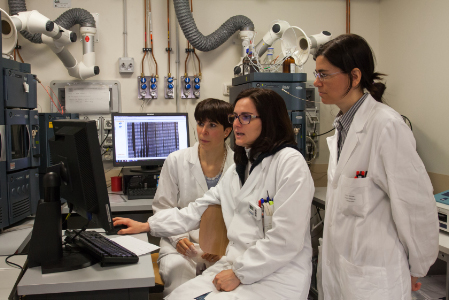- Authors:
-
Melisi, D; Oh, D; Hollebecque, A; Calvo, E; Varghese, A; Borazanci, E; Macarulla, T; Merz, V; Zecchetto, C; Zhao, Ym; Gueorguieva, I; Man, M; Gandhi, L; Estrem, St; Benhadji, Ka; Lanasa, Mc; Avsar, E; Guba, Sc; Garcia-Carbonero, R
- Title:
-
Safety and activity of the TGF beta receptor I kinase inhibitor galunisertib plus the anti-PD-L1 antibody durvalumab in metastatic pancreatic cancer
- Year:
-
2021
- Type of item:
-
Articolo in Rivista
- Tipologia ANVUR:
- Articolo su rivista
- Language:
-
Inglese
- Referee:
-
No
- Name of journal:
- JOURNAL FOR IMMUNOTHERAPY OF CANCER
- ISSN of journal:
- 2051-1426
- N° Volume:
-
9
- Number or Folder:
-
3
- Page numbers:
-
1-10
- Keyword:
-
immunotherapy; tumor biomarkers; therapies; investigational; tumor microenvironment; clinical trials as topic
- Short description of contents:
- Background We assessed the safety, efficacy, and pharmacokinetics of the transforming growth factor beta (TGF beta) receptor inhibitor galunisertib co-administered with the anti-programmed death-ligand 1 (PD-L1) antibody durvalumab in recurrent/refractory metastatic pancreatic cancer previously treated with <= 2 systemic regimens.Methods This was a two-part, single-arm, multinational, phase Ib study. In a dose-finding phase, escalating oral doses of galunisertib were co-administered on days 1-14 with fixed-dose intravenous durvalumab 1500 mg on day 1 every 4 weeks (Q4W), followed by an expansion cohort phase.Results The galunisertib recommended phase II dose (RP2D) when co-administered with durvalumab 1500 mg Q4W was 150 mg two times per day. No dose-limiting toxicities were recorded. Among 32 patients treated with galunisertib RP2D, 1 patient had partial response, 7 had stable disease, 15 had objective progressive disease, and 9 were not evaluable. Disease control rate was 25.0%. Median overall survival and progression-free survival were 5.72 months (95% CI: 4.01 to 8.38) and 1.87 months (95% CI: 1.58 to 3.09), respectively. Pharmacokinetic profiles for combination therapy were comparable to those published for each drug. There was no association between potential biomarkers and treatment outcomes.Conclusion Galunisertib 150 mg two times per day co-administered with durvalumab 1500 mg Q4W was tolerable. Clinical activity was limited. Studying this combination in patients in an earlier line of treatment or selected for predictive biomarkers of TGF beta inhibition might be a more suitable approach.
- Product ID:
-
121335
- Handle IRIS:
-
11562/1044673
- Last Modified:
-
January 26, 2025
- Bibliographic citation:
-
Melisi, D; Oh, D; Hollebecque, A; Calvo, E; Varghese, A; Borazanci, E; Macarulla, T; Merz, V; Zecchetto, C; Zhao, Ym; Gueorguieva, I; Man, M; Gandhi, L; Estrem, St; Benhadji, Ka; Lanasa, Mc; Avsar, E; Guba, Sc; Garcia-Carbonero, R,
Safety and activity of the TGF beta receptor I kinase inhibitor galunisertib plus the anti-PD-L1 antibody durvalumab in metastatic pancreatic cancer
«JOURNAL FOR IMMUNOTHERAPY OF CANCER»
, vol.
9
, n.
3
,
2021
,
pp. 1-10
Consulta la scheda completa presente nel
repository istituzionale della Ricerca di Ateneo 








